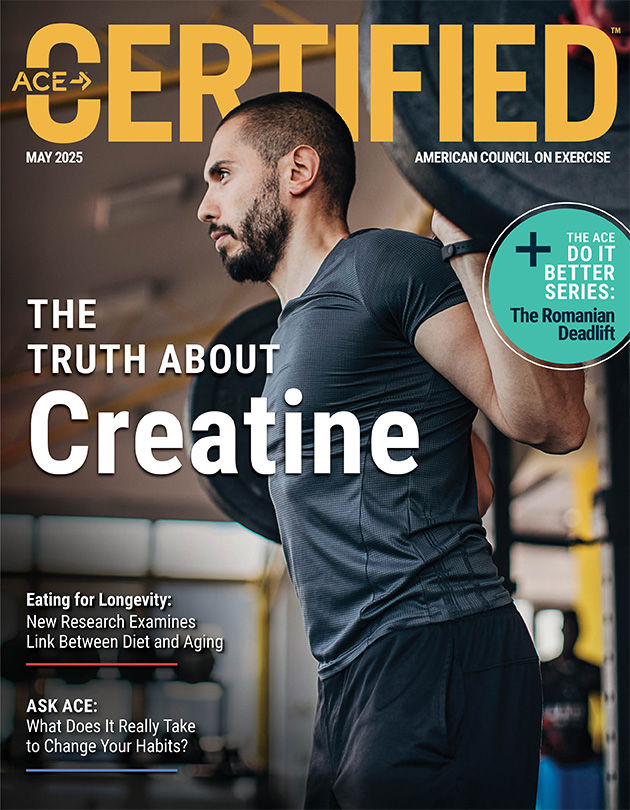
Eating for Longevity: New Research Examines Link Between Diet and Aging

As a health and exercise professional, you understand the importance of nutrition in preventing chronic disease. But a landmark new study suggests there’s an even broader role for food choices—one that extends beyond disease prevention and into the very quality of life people experience as they age.
A Holistic Definition of Healthy Aging
Published in Nature Medicine, the study from Harvard T.H. Chan School of Public Health and collaborating universities analyzed data from more than 105,000 adults over a 30-year span. What sets this research apart is its focus on healthy aging, defined not just by lifespan, but by healthspan, which is defined as reaching at least age 70 free of major chronic diseases and with preserved physical function, mental health and cognitive clarity.
“Studies have previously investigated dietary patterns in the context of specific diseases or how long people live. Ours takes a multifaceted view, asking, how does diet impact people’s ability to live independently and enjoy a good quality of life as they age?” explains co-author Frank Hu, Fredrick J. Stare Professor of Nutrition and Epidemiology and chair of the Department of Nutrition at Harvard Chan School. In other words, rather than isolating one disease or outcome, researchers used a multidimensional model that mirrors the goals many of your clients likely have: staying independent, mentally sharp and physically capable well into older age.
The Foods That Promote Healthy Aging
The researchers used data from the Nurses’ Health Study and the Health Professionals Follow-Up Study. Participants regularly completed dietary questionnaires, which the researchers scored on how well participants adhered to eight healthy dietary patterns: the Alternative Healthy Eating Index (AHEI), the Alternative Mediterranean Index (aMED), the Dietary Approaches to Stop Hypertension (DASH), the Mediterranean-DASH Intervention for Neurodegenerative Delay (MIND), the healthful plant-based diet (hPDI), the Planetary Health Diet Index (PHDI), the empirically inflammatory dietary pattern (EDIP), and the empirical dietary index for hyperinsulinemia (EDIH). Each of these diets emphasizes a high intake of fruits, vegetables, whole grains, unsaturated fats, nuts and legumes, and some also include a low-to-moderate intake of healthy animal-based foods such as fish and certain dairy products. The researchers also assessed participants’ intake of ultra-processed foods, which are industrially manufactured and often contain artificial ingredients, added sugars, sodium and unhealthy fats.
The study found that 9,771 participants—9.3% of the study population—aged healthfully. Importantly, they found that adhering to any one of the healthy dietary patterns was linked to overall healthy aging and its individual domains, including cognitive, physical and mental health.
The leading healthy diet was the AHEI, which was developed to prevent chronic diseases. Participants in the highest quintile (i.e., the top 20%) of the AHEI score had an 86% greater likelihood of healthy aging at 70 years and a 2.2-fold higher likelihood of healthy aging at 75 years compared to those in the lowest quintile of the AHEI score. The AHEI diet is rich in fruits, vegetables, whole grains, nuts, legumes and healthy fats, and low in red and processed meats, sugar-sweetened beverages, sodium and refined grains. Another leading diet for healthy aging was the PHDI, which considers both human and environmental health by emphasizing plant-based foods and minimizing animal-based foods.
The study showed that people who consumed diets rich in whole, unprocessed foods—especially fruits, vegetables, whole grains, legumes, nuts and unsaturated fats—were significantly more likely to experience healthy aging. Low-to-moderate intake of healthy animal-based foods, such as fish and certain dairy products, also contributed to positive outcomes.
At the same time, diets higher in ultra-processed foods—particularly processed meats and sugary or artificially sweetened beverages—were linked to poorer aging outcomes. These individuals were less likely to maintain physical and cognitive function or reach older age without chronic disease.
Notably, unsaturated fats—particularly polyunsaturated fatty acids—showed especially strong associations with preserved function and longevity. These fats were connected not only to surviving into older age, but also to maintaining the ability to move well and think clearly along the way.
Diet Quality Matters—Not Specific Labels
Although the researchers evaluated eight different dietary patterns, including well-known approaches like the Mediterranean and DASH diets, their key message wasn’t about promoting a single "perfect" diet. Instead, the findings emphasize the value of overall dietary quality, showing that different patterns emphasizing core healthy foods can all be effective.
“There is no one-size-fits-all diet,” says lead author Anne-Julie Tessier, assistant professor in the Department of Nutrition at the University of Montreal, researcher at the Montreal Heart Institute, and visiting scientist at Harvard T. H. Chan School of Public Health. “Healthy diets can be adapted to fit individual needs and preferences.” This flexibility is especially helpful when working with diverse client populations, allowing you to personalize nutrition guidance while sticking to proven principles.
Long-term Habits Create Long-term Results
What makes this research especially compelling is its long follow-up period. Over 30 years, participants submitted regular dietary assessments, allowing researchers to observe the cumulative effects of dietary habits over time. Even after adjusting for factors like socioeconomic status, physical activity and multivitamin use, diet quality remained a powerful independent predictor of healthy aging.
The researchers also broke down their findings by individual domains of health. Participants with higher-quality diets were more likely to avoid chronic conditions, preserve mental and physical function, and maintain cognitive health. Importantly, these associations held across both men and women, although the benefits appeared somewhat stronger for women.
Practical Takeaways for Health and Exercise Professionals
This study reinforces the importance of incorporating nutrition coaching into your practice, even if your primary focus is personal training. While it is essential that you stay within your scope of practice, you don’t have to be a registered dietitian nutritionist to talk about food in a meaningful way. Helping clients understand that their everyday choices—what they eat for lunch, how often they cook at home, how much they rely on processed convenience foods—can directly impact how they’ll feel and function decades from now can be a powerful motivator.
One of the most effective ways to frame these conversations is through function-focused goals. While some clients may be motivated by the idea of preventing disease, many will resonate more with staying mentally sharp, being able to travel in retirement or playing with their grandchildren without pain or fatigue. Helping clients make the connection between nutrition and these lived experiences can lead to more lasting behavior change.
You can also encourage gradual shifts, which can feel much more manageable. Things like adding more vegetables, cooking more meals at home, swapping in whole grains or reducing sugary or packaged foods are relatively small steps that can have a big impact on health. Just be sure to emphasize consistency over perfection. And always bring it back to the idea that nutrition is an investment not only in years of life, but in the quality of life within those years.
From Prevention to Promotion
This study marks a shift in how we talk about aging and nutrition—from a model centered on preventing illness to one focused on promoting long-term function and vitality. As co-author Marta Guasch-Ferré put it, “Since staying active and independent is a priority for both individuals and public health, research on healthy aging is essential.”
For health and exercise professionals, that means you are not just supporting people in avoiding disease—you are empowering them to build a future filled with mobility, clarity and connection. And that future, as this study confirms, begins with what’s on the plate.
Expand Your Knowledge
Motivating Older Adults: The Key to Health Aging
According to the Centers for Disease Control and Prevention, one in four US adults over 50 do not engage in regular physical activity. How do we encourage these individuals—particularly those who have spent a lifetime void of exercise—to make moving a habit? The key is understanding behavior change strategies. In this video training led by Anthony Wall, ACE Certified Personal Trainer and ACE Behavior Change Specialist, you will explore Prochaska’s Stages of Change to better understand the mindset of older adults. By learning important motivational strategies, you will be prepared to design effective programs tailored to your clients and give them the support and tools they need to embrace more active lifestyles.
Nutrition for Health Promotion
More and more exercise and health professionals are working closely with clients with chronic diseases related to their lifestyle. It’s important to provide these clients evidence-based information on what to do, how to do it and direction on referrals while guiding them through lifestyle change. Personalized nutrition uses diagnostic tools to identify how a person’s unique molecular and genetic profile might predispose them to or protect them from certain diseases. This information can then be used to tailor interventions i.e. diet, exercise, medication, etc. While personalized nutrition plans are outside the scope of practice for exercise professionals, a better understanding of what genetic and epigenetic factors may impact a client’s lifestyle, disease risk and ultimately their health is essential to providing the best care and service. Led by Dominique Adair, MS., RD., a nutrition and fitness advisor, public speaker, educator, writer and President of Adair Fitness & Nutrition along with Alison Steiber, Ph.D., a registered dietician nutritionist and Chief Science Officer at the Academy of Nutrition & Dietetics, this two-part series will provide an introduction to biological and genetic factors that affect your clients so that you can better help them along their journey toward better health.

More Articles
- Certified™: May 2025
Creatine Reconsidered: What the Latest Research Reveals
Contributor
- Certified™: May 2025
The ACE Do it Better Series: The Romanian Deadlift
Health and Fitness Expert
- Certified™: May 2025
Beyond the Scale: Innovative Metrics and Holistic Strategies for Transformative Client Success
Contributor




 by
by 



